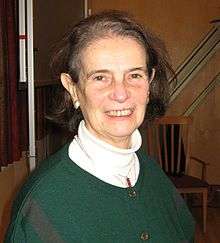Nelly Ben-Or
Nelly Nechama Ben-Or (born 1933), also known as Nelly Ben-Or Clynes, is a concert pianist and professor of music. She is a professor at the Guildhall School of Music and Drama in the United Kingdom where she has taught the piano and the Alexander technique since 1975. Ben-Or is a Holocaust survivor.
Nelly Ben-Or | |
|---|---|
 | |
| Born | Nelly Nechama Ben-Or 1933 |
| Other names | Nelly Ben-Or Clynes |
Early life
Ben-Or was born in 1933 to a Jewish family in Lwow, Poland (now Ukraine).
During World War II, her family was imprisoned in a ghetto. Her mother, sister and Nelly escaped, but her father did not. When they obtained false identities, she was separated from her sister, who went into hiding and found employment as a domestic servant. Ben-Or and her mother pretended to be Roman Catholics and travelled to Warsaw, where her mother worked for a Christian family for a year as a maid. Having missed the last passenger train to Warsaw, they were placed by the German station master on a train reserved for Wehrmacht officers. The family in Warsaw paid for Ben-Or to have piano lessons along with their own daughter after hearing her play. Occasionally, when people suspected they were Jews, they would be forced to move on, but managed to escape.[1][2]
Career
A distinguished pianist, and a senior Alexander Technique teacher (in 1963 she became the first pianist to qualify as a teacher of the Alexander Technique), Ben-Or is internationally acknowledged as being the leading exponent of the application of the Alexander Technique to piano playing, in which field she has specialised for more than thirty-five years. She gives master classes on the technique to pianists in many countries throughout the world.[3]
She has performed in concerts and broadcasts throughout the world, in recitals, with orchestra and in chamber music. Ben-Or has made numerous commercial and broadcast recordings, including for the BBC. These recordings cover music by a wide range of composers from the 18th to the 20th centuries.[4]
Moving to England in 1960, she met and married her English husband and later moved to Northwood in London.
In the late 1980s, she taught young Brendan Kavanagh classical piano, helping him complete his Grade 8 theory and practical requirements. He credits his success today as an improvisational classical/boogie-woogie pianist to her support and encouragement of his improvisational style.[5]:01:28
In 1999, the Nelly Ben-Or Scholarship Trust was established, whose patron is Sir Colin Davis.[4]
References
- Nelly Ben-Or Clynes Story. Pub. by Northwood and Pinner Synagogue (2008)
- Liphshiz, Cnaan. "Nelly Ben-Or risked all to play the piano. It helped her survive the Holocaust". www.timesofisrael.com. Retrieved 29 February 2020.
- Piano Courses and The Alexander Technique
- Guildhall School of Music and Drama: Department of Piano Studies
- "Dr K's classical and boogie-woogie mentors (01:28)". YouTube. Retrieved 24 January 2020.
External links
- Her life, in her own words at Northwood Holocaust Memorial Day Events
- Ben-Or at the Guildhall School of Music and Drama
- Ben-Or and the Alexander Technique
- Ben-Or and the 2008 International Alexander Technique Congress